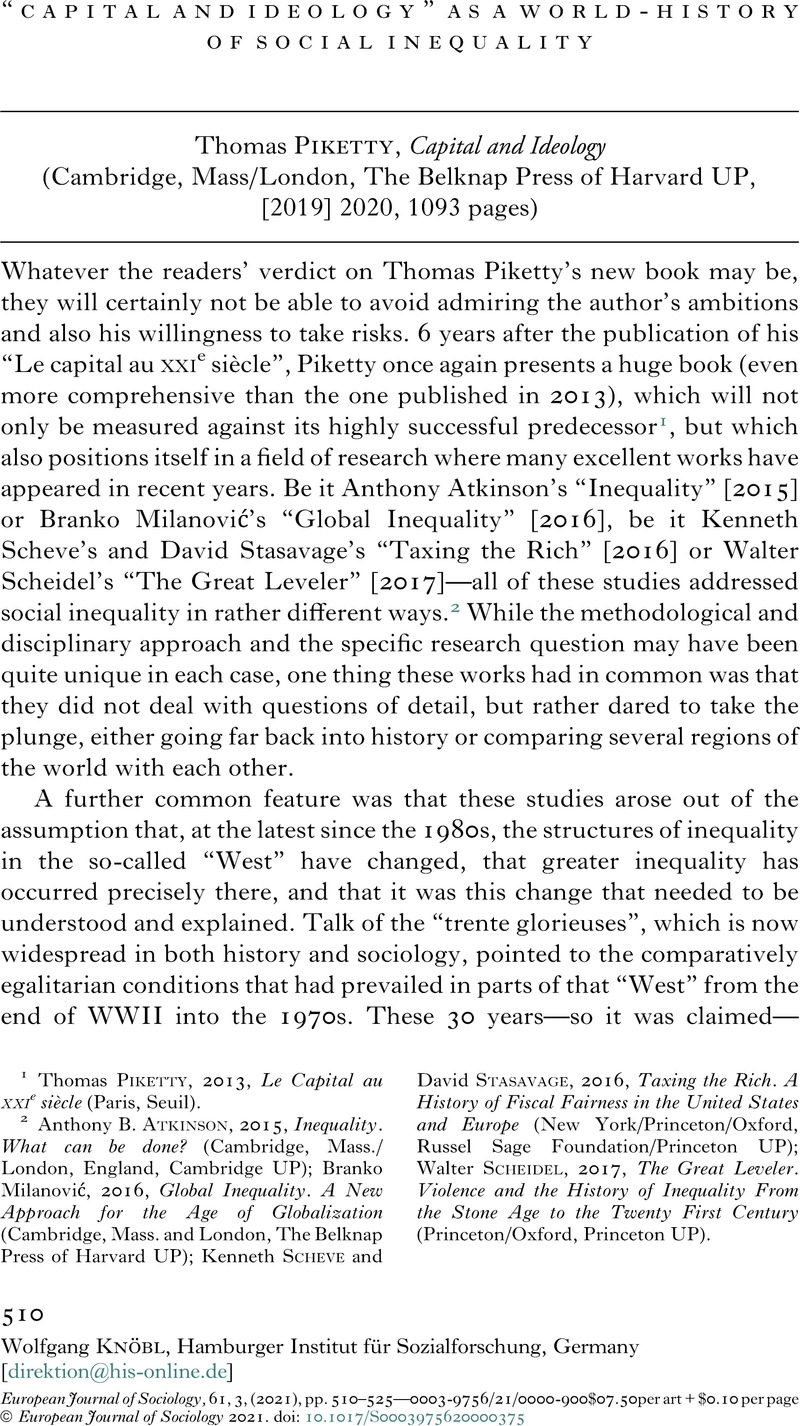No CrossRef data available.
Article contents
“Capital and Ideology” as a World-History of Social Inequality - Thomas Piketty, Capital and Ideology (Cambridge, Mass/London, The Belknap Press of Harvard UP, [2019] 2020, 1093 pages)
Published online by Cambridge University Press: 26 March 2021
Abstract

- Type
- Book Review
- Information
- European Journal of Sociology / Archives Européennes de Sociologie , Volume 61 , Issue 3 , December 2020 , pp. 510 - 525
- Copyright
- © European Journal of Sociology 2021
References
1 Piketty, Thomas, 2013, Le Capital au xxie siècle (Paris, Seuil).Google Scholar
2 Atkinson, Anthony B., 2015, Inequality. What can be done? (Cambridge, Mass./London, England, Cambridge UP)CrossRefGoogle Scholar; Branko Milanović, 2016, Global Inequality. A New Approach for the Age of Globalization (Cambridge, Mass. and London, The Belknap Press of Harvard UP); Kenneth Scheve and David Stasavage, 2016, Taxing the Rich. A History of Fiscal Fairness in the United States and Europe (New York/Princeton/Oxford, Russel Sage Foundation/Princeton UP); Walter Scheidel, 2017, The Great Leveler. Violence and the History of Inequality From the Stone Age to the Twenty First Century (Princeton/Oxford, Princeton UP).
3 Doering-Manteuffel, Anselm and Raphael, Lutz, 2010, Nach dem Boom. Perspektiven auf die Zeitgeschichte seit 1970 (Göttingen, Vandenhoeck & Ruprecht)Google Scholar; Page 13, in Judith Stein, 2010, Pivotal Decade. How the United States Traded Factories for Finance in the Seventies (New Haven/London, Yale UP); Wolfgang Streeck, 2017, Buying Time: The Delayed Crisis of Democratic Capitalism (London, Verso); Ariane Leendertz, 2017, “Zeitbögen, Neoliberalismus und das Ende des Westens, oder: Wie kann man die deutsche Geschichte des 20. Jahrhunderts schreiben? », Vierteljahreshefte für Zeitgeschichte, 65 : 191-217.
4 Page 56, in Milanović, Global Inequality, 56ff; cf. also, of course, Page 30, in Piketty, Le Capital.
5 Page 113, in Milanović, Global Inequality.
6 Lenski, Gerhard, 1966, Power and Privilege. A Theory of Social Stratification (New York, McGraw-Hill).Google Scholar
7 There is a certain tension in Piketty’s book. On the one hand he, at the very beginning, explicitly defines ideology as a kind of system of ideas (“I use ‘ideology’ in a positive and constructive sense to refer to a set of plausible ideas and discourses describing how society should be structured.” [3]). On the other hand he is rather hesitant in using works written by intellectual historians which then leads to the problematic consequence that in the course of his narrative the term “ideology” increasingly loses a clear-cut meaning and even becomes identified with very different institutions that have been built around or where only accidentally situated next to the concept of “ownership”.
8 Lynd, Robert, [1939] 1964, Knowledge for What? The Place of Social Science in American Culture (New York, Grove Press).Google Scholar
9 As Piketty explains, the clergy in European history, in contrast to the ‘functionaries’ in other religions, for example those in India or China, was not a class (an estate) that could perpetuate itself through inheritance rules—due to celibacy. As a consequence, the clergy had to be structured by formal legal regulations and privileges. In this way the church became an “ownership organization” and thereby enormously rich [97].
10 Cf. page 331, in Wende, Peter, 2008, Das Britische Empire. Geschichte eines Weltreichs (Munich, C.H. Beck).CrossRefGoogle Scholar
11 Pomeranz, Kenneth, 2000, The Great Divergence. China, Europe, and the Making of the Modern World Economy (Princeton and Oxford, Princeton UP).CrossRefGoogle Scholar
12 A kind of exception in this trend, however, is the voting behavior of, for example, Muslim migrants in France who continue to vote undaunted and by a large majority for left-wing parties because they rightly assume that they have little to expect from politically conservative politicians [780].




